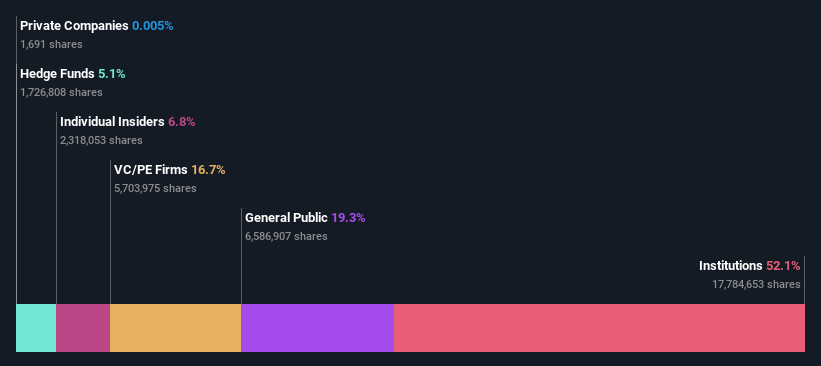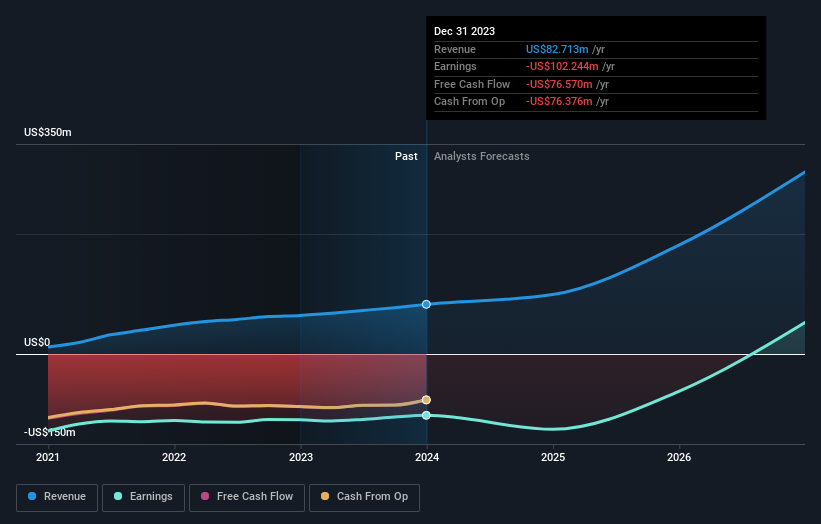UroGen Pharma Ltd.'s (NASDAQ:URGN) high institutional ownership speaks for itself as stock continues to impress, up 11% over last week
Key Insights
Institutions' substantial holdings in UroGen Pharma implies that they have significant influence over the company's share price
The top 9 shareholders own 50% of the company
Every investor in UroGen Pharma Ltd. (NASDAQ:URGN) should be aware of the most powerful shareholder groups. The group holding the most number of shares in the company, around 52% to be precise, is institutions. That is, the group stands to benefit the most if the stock rises (or lose the most if there is a downturn).
And as as result, institutional investors reaped the most rewards after the company's stock price gained 11% last week. One-year return to shareholders is currently 57% and last week’s gain was the icing on the cake.
In the chart below, we zoom in on the different ownership groups of UroGen Pharma.
View our latest analysis for UroGen Pharma
What Does The Institutional Ownership Tell Us About UroGen Pharma?
Many institutions measure their performance against an index that approximates the local market. So they usually pay more attention to companies that are included in major indices.
UroGen Pharma already has institutions on the share registry. Indeed, they own a respectable stake in the company. This suggests some credibility amongst professional investors. But we can't rely on that fact alone since institutions make bad investments sometimes, just like everyone does. When multiple institutions own a stock, there's always a risk that they are in a 'crowded trade'. When such a trade goes wrong, multiple parties may compete to sell stock fast. This risk is higher in a company without a history of growth. You can see UroGen Pharma's historic earnings and revenue below, but keep in mind there's always more to the story.
Investors should note that institutions actually own more than half the company, so they can collectively wield significant power. It would appear that 5.1% of UroGen Pharma shares are controlled by hedge funds. That catches my attention because hedge funds sometimes try to influence management, or bring about changes that will create near term value for shareholders. Our data shows that RA Capital Management, L.P. is the largest shareholder with 9.0% of shares outstanding. Great Point Partners, LLC is the second largest shareholder owning 7.7% of common stock, and Menora Mivtachim Pensions & Gemel Ltd. holds about 6.7% of the company stock. Additionally, the company's CEO Elizabeth Barrett directly holds 1.0% of the total shares outstanding.
We also observed that the top 9 shareholders account for more than half of the share register, with a few smaller shareholders to balance the interests of the larger ones to a certain extent.
Researching institutional ownership is a good way to gauge and filter a stock's expected performance. The same can be achieved by studying analyst sentiments. There are plenty of analysts covering the stock, so it might be worth seeing what they are forecasting, too.
Insider Ownership Of UroGen Pharma
The definition of company insiders can be subjective and does vary between jurisdictions. Our data reflects individual insiders, capturing board members at the very least. Management ultimately answers to the board. However, it is not uncommon for managers to be executive board members, especially if they are a founder or the CEO.
I generally consider insider ownership to be a good thing. However, on some occasions it makes it more difficult for other shareholders to hold the board accountable for decisions.
We can report that insiders do own shares in UroGen Pharma Ltd.. As individuals, the insiders collectively own US$35m worth of the US$515m company. Some would say this shows alignment of interests between shareholders and the board. But it might be worth checking if those insiders have been selling.
General Public Ownership
With a 19% ownership, the general public, mostly comprising of individual investors, have some degree of sway over UroGen Pharma. While this size of ownership may not be enough to sway a policy decision in their favour, they can still make a collective impact on company policies.
Private Equity Ownership
With a stake of 17%, private equity firms could influence the UroGen Pharma board. Sometimes we see private equity stick around for the long term, but generally speaking they have a shorter investment horizon and -- as the name suggests -- don't invest in public companies much. After some time they may look to sell and redeploy capital elsewhere.
Next Steps:
It's always worth thinking about the different groups who own shares in a company. But to understand UroGen Pharma better, we need to consider many other factors. Case in point: We've spotted 4 warning signs for UroGen Pharma you should be aware of, and 1 of them shouldn't be ignored.
But ultimately it is the future, not the past, that will determine how well the owners of this business will do. Therefore we think it advisable to take a look at this free report showing whether analysts are predicting a brighter future.
NB: Figures in this article are calculated using data from the last twelve months, which refer to the 12-month period ending on the last date of the month the financial statement is dated. This may not be consistent with full year annual report figures.
Have feedback on this article? Concerned about the content? Get in touch with us directly. Alternatively, email editorial-team (at) simplywallst.com.
This article by Simply Wall St is general in nature. We provide commentary based on historical data and analyst forecasts only using an unbiased methodology and our articles are not intended to be financial advice. It does not constitute a recommendation to buy or sell any stock, and does not take account of your objectives, or your financial situation. We aim to bring you long-term focused analysis driven by fundamental data. Note that our analysis may not factor in the latest price-sensitive company announcements or qualitative material. Simply Wall St has no position in any stocks mentioned.

 Yahoo Finance
Yahoo Finance 

